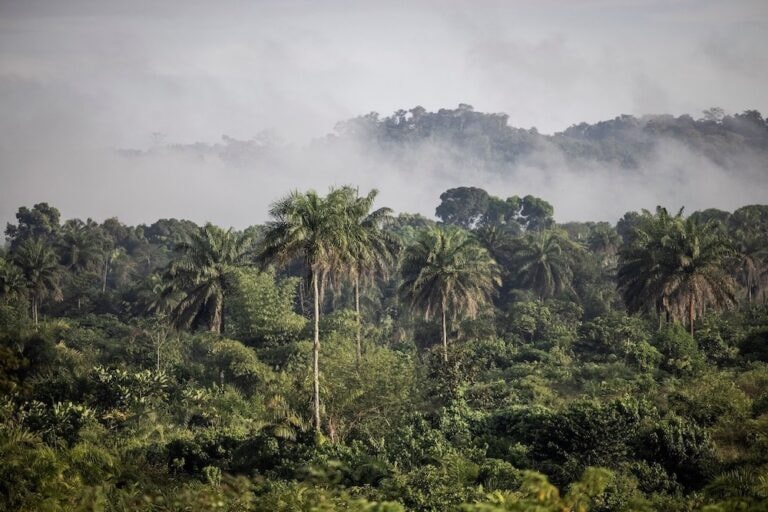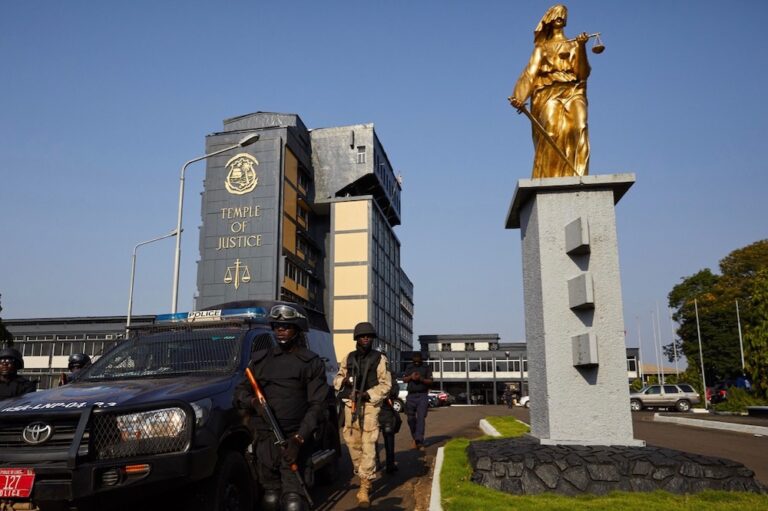(IPI/IFEX) – In a 17 July 2002 letter to President Charles Taylor, IPI expressed its deep concern over the latest arrests of journalists critical of the Liberian government. According to information provided to IPI, on 4 July security forces arrested and detained senior reporter Bobby Tapson and judicial reporter Sherrif Adams, who are employed by […]
(IPI/IFEX) – In a 17 July 2002 letter to President Charles Taylor, IPI expressed its deep concern over the latest arrests of journalists critical of the Liberian government.
According to information provided to IPI, on 4 July security forces arrested and detained senior reporter Bobby Tapson and judicial reporter Sherrif Adams, who are employed by “The News”. Both journalists were arrested for their alleged role in a 4 July report entitled, “Terror Descends On Monrovia”. The report stated that dead bodies were being discovered on the streets of the capital. After spending more than an hour in police custody they were released after officials realised they were not involved in publishing the story.
Subsequently, “The News” reporter George Bardue and editor Jerome Dalieh attended police headquarters due to their involvement in the news report. The two men were held for over two hours before being released.
Aside from the above, Hassan Bility, editor of “The Analyst” newspaper, was arrested by security forces on 24 June. Bility is being held for his alleged connection to a plot to remove the Taylor government. Despite a court order, awarded after human rights lawyers sought a writ of habeas corpus, the Liberian government has failed on two separate occasions to produce Bility. In consequence, there are genuine fears for his life and there has been speculation that the journalist may have been murdered while being held in custody (see IFEX alerts of 4, 3 and 2 July 2002).
On the same day as the arrests of Tapson and Adams, a Liberian staff member at the United Nations High Commission for Refugees (UNHCR), Suku Wesseh, was also arrested. Wesseh is the brother of Conmany Wesseh, the exiled executive director of the Centre for Democratic Empowerment.
Unfortunately for press freedom in Liberia, the most recent arrests are only the latest in a steady wave of attacks on the media. According to IPI, there are signs that reports on the conflict between government forces and the rebel Liberians United for Democracy and Reconciliation (LURD) have so unnerved the president that he is determined to wipe out the remaining elements of the independent media in the war torn country.
During the previous 18 months, both “The Analyst” and “The News” have suffered the close attentions of the government. In February 2001, “The Analyst” and “The News” were closed down along with two other media organisations for allegedly failing to pay back taxes. They were later allowed to reopen. Almost exactly one year later, four journalists with “The Analyst” newspaper were arrested and held for 24 hours. All four were accused of writing articles that were “not out for peace” and which “poisoned the minds of the people” (see IFEX alerts of 22 and 13 February 2002). On 26 April, “The Analyst”‘s offices were closed for a month after a police search (see IFEX alerts of 29 April and 6 May 2002). They were later re-opened on the orders of the president.
Recommended Action
Send appeals to the president:
– calling on him and the Liberian government to end speculation about Bility by releasing him
– requesting that he change his policy towards the media
– reminding him that the media form an essential element of democracy and that, by seeking to prevent free and open reporting, he is further damaging the reputation of Liberia in the eyes of the international community
– calling upon him to therefore reaffirm the right of the media “to seek, receive and impart information and ideas through any media and regardless of borders”, as defined by Article 19 of the United Nations Universal Declaration of Human Rights
Appeals To
His Excellency Charles Taylor
President
Republic of Liberia
Monrovia, Liberia
Fax: +231 226 360
Please copy appeals to the source if possible.


